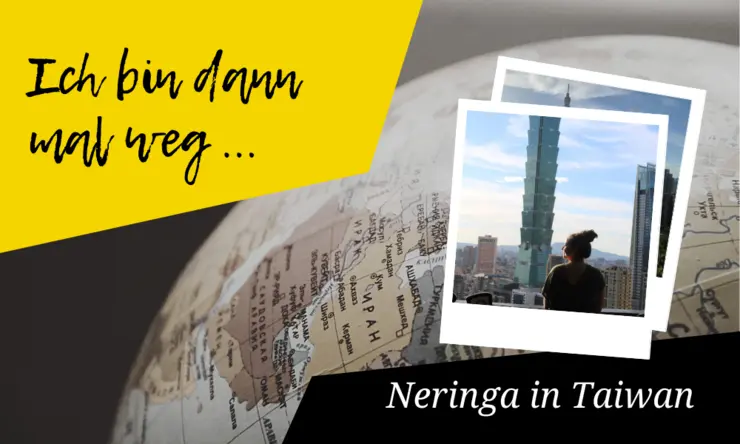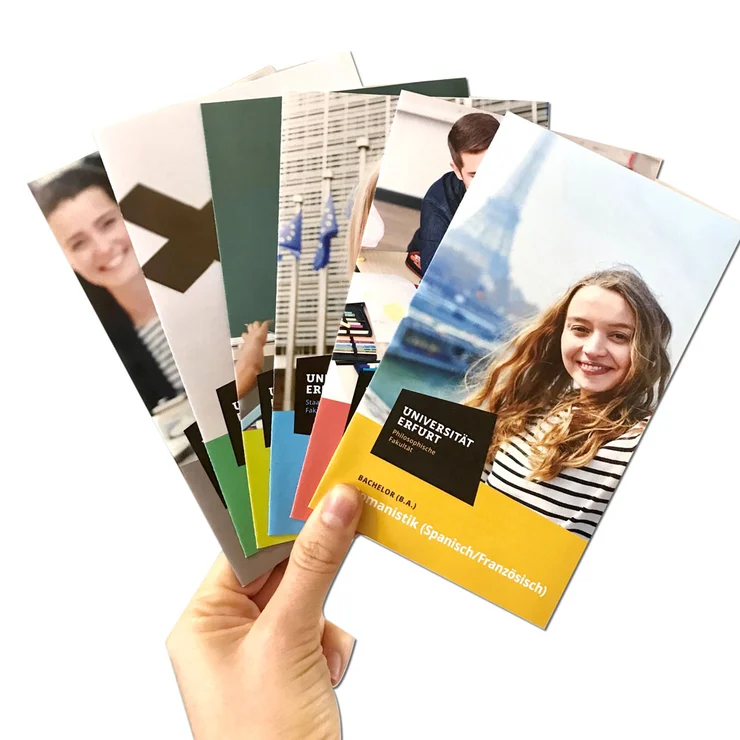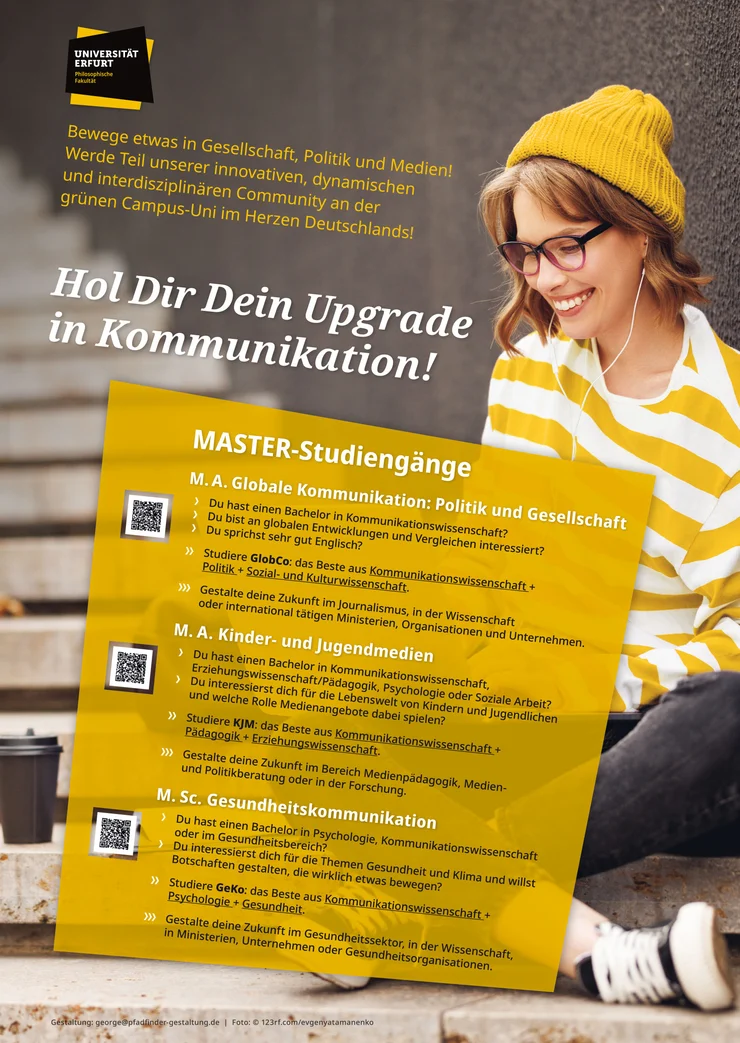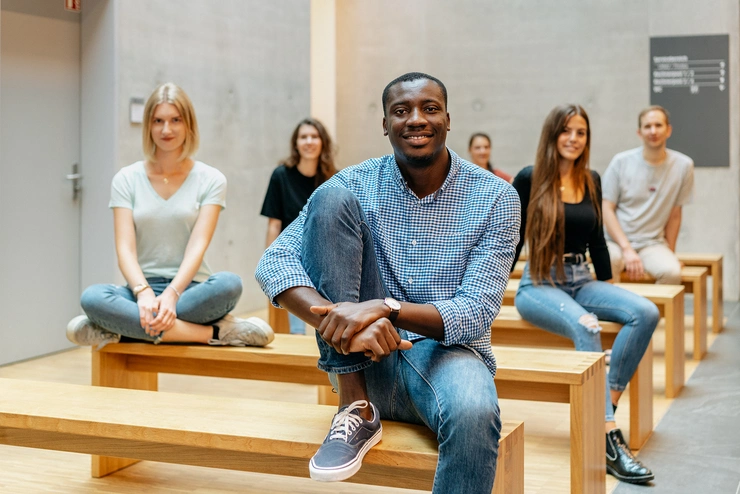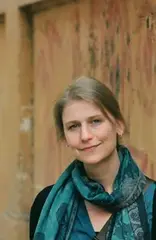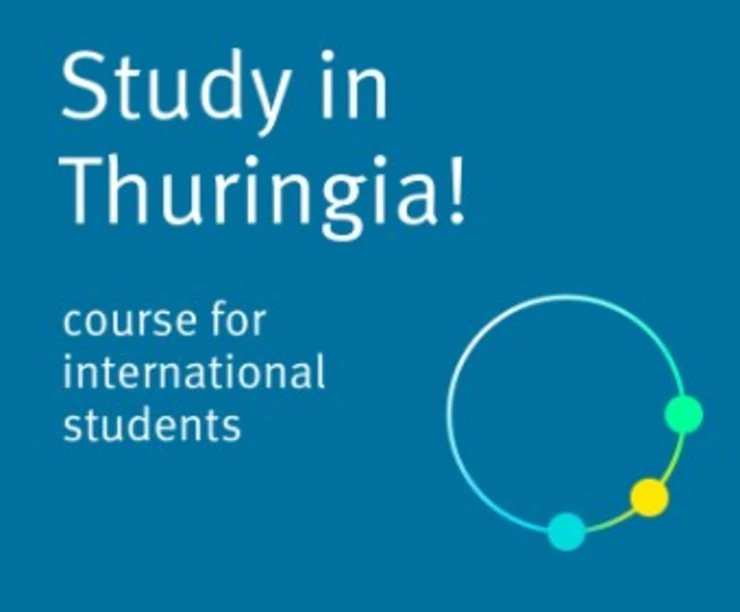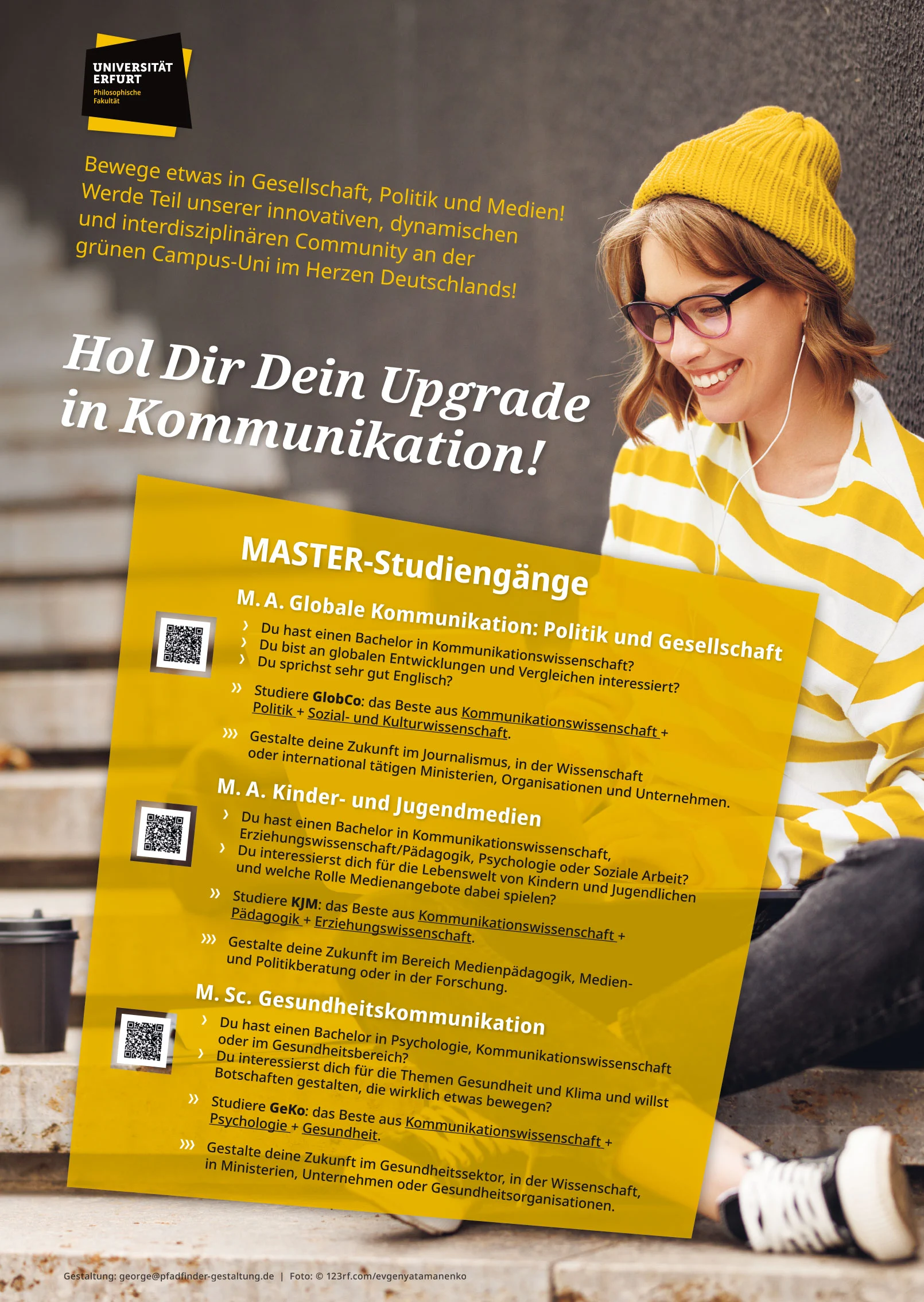Global Communication: Politics and Society
Course content of the Master's programme in Global Communication
The Master's in Global Communication: Politics and Society is an English-language consecutive degree programme that deals with media systems and communication cultures in international comparison.
Traditional research fields of social and political communication as well as media communication are placed in a global perspective. The degree programme is innovative because it does not view communication science issues as isolated national processes, but as "global communication" in the sense of international comparisons. This sharpens the focus on the common communicative challenges of the world.
In the courses, special emphasis is placed on the equal inclusion of the Global North and South as well as communicative interactions.
Topics and fields of application of global communication
- Role of the media in democracies, political upheavals, wars and conflicts in different regions of the world
e.g. foreign reporting, war and crisis communication, - Connection between media and globalisation
e.g. information society, global entertainment culture, global public sphere, - media developments in Asia, Africa, the Middle East and Latin America,
- Migration and the public sphere
e.g. hate speech, racism, intercultural communication processes, - Globalisation and everyday communication
e.g. communication and tourism, - Communication in Islamic-Western relations
e.g. media and stereotypes, diplomatic communication, terror as a communication strategy, - global business communication
e.g. corporate networks, marketing and culture, - current changes in media production and use in international comparison
e.g. journalism and ethics in global comparison.
The degree programme is primarily oriented towards the social sciences , but also takes cultural studies content into account. In addition to scientific analysis and training in qualitative and quantitative methods, students also learn scientific communication counselling.
Special features of the degree programme
After learning the basics of global comparative communication research, our students deepen their knowledge of various subjects in the compulsory elective area of the programme. Political as well as social and cultural effects and uses of mediatisation are discussed in the area of politics and society; in the media specialisation, the focus is on media-related processes of change. You can choose freely from the range of specialisation modules and set your own focus.
Our students receive in-depth training in standardised and non-standardised survey and evaluation methods and develop their own research projects. There is also the opportunity to work on research projects at the Department of Media and Communication Studies. Independent research is encouraged here. A fast track to a doctorate is also possible if the appropriate requirements are met.
We attach great importance to the close integration of basic research and application-orientation. Our students are therefore familiarised with scientifically supported communication consulting for politics and society, in ministries, foundations and NGOs. In a compulsory internship, students can try out consulting in an internationally active company in Germany or abroad. For students who are aiming for an academic career, we also encourage early participation in academic exchange, e.g. through the application for presentations at conferences organised by ICA, IAMCR, DGPuK, ECREA or similar and the submission of articles for academic journals.
The Master's in Global Communication: Politics and Society not only stands for the internationalisation of communication science research. Internationalisation also applies to everyday student life. This includes the fact that English is the language of instruction and colloquial language, which promotes the academic and private exchange of international students. We promote stays abroad as part of the study abroad programme and/or an internship abroad. German and international students work closely together here.
The Department of Media and Communication Studies promotes close cooperation between students and lecturers. Short distances on campus, good accessibility and, above all, small seminar groups of usually around 15 students ensure a positive learning atmosphere in which a lively exchange between students and lecturers is possible.
Come to the Open Day and find out more about the Master's programme Global Communication: Politics & Society.
Job & Career Perspectives
This study programme enables you to work in a wide range of academic and private social, market and media research. It also qualifies for various professions such as journalism, public relations and the broad field of scientifically supported communication consulting of politics and society, in ministries, foundations and NGOs. The research-oriented programme also prepares for an academic career. There is also a “Fast Track to PhD” programme for doctoral studies. The focus on a global comparative research perspective and communication consultancy skills in international contexts opens up professional fields at home and abroad.
Details of the degree programme
Internship: Academic counselling for politics and society
During the degree programme, students must complete an internship in an internationally oriented political, business or social institution. Academic communication counselling and consulting should be applied there and learned in practice. The subject advice and counselling service will support you in your search for suitable internships.
It is advisable to spend a semester at one of the many partner universities in Europe and abroad. The 3rd semester is ideally suited for this as an optional mobility window. University partnerships currently exist in Spain, Estonia, Croatia, Lithuania, Switzerland, the Netherlands, Portugal, Italy, Indonesia and the USA, among others. We would be happy to advise you individually.
What is the Fast Track doctorate programme?
Fast Track means that talented Master's students are given the opportunity to signal their interest in a possible doctorate at an early stage and to orientate their studies towards this goal. Important parts of the programme, such as the master's thesis, are designed to enable the smoothest possible transition to the doctoral phase, which significantly shortens the time it takes to complete the doctorate.
How does the Fast Track programme work?
In your fourth semester, you will complete a master's thesis in which you demonstrate that you are able to work independently on the assigned topic using scientific methods and present the results appropriately within the allotted time. On the other hand, you also justify your acceptance as a doctoral candidate with a topic based on the content of your master's thesis.
What added value does the Fast Track programme have on the path to a doctorate?
- Early involvement in doctoral colloquia or the doctoral programme - the master's thesis can already be presented and discussed
- Shortening of the doctoral phase by at least one semester (due to the preparatory work in the master's thesis phase)
- Simplified acceptance as a doctoral candidate of the Faculty of Philosophy after completion of the Master's degree (preparation of an exposé is not required)
- Follow-up supervision after the master's thesis and support in the utilisation of the knowledge gained

Open Day
Numerous information and counselling services offer you the opportunity to see the study and living conditions in Erfurt for yourself at the Open Day. Get to know the green campus and the beautiful old town centre on guided tours. Information on the programme: Open Day
You may also be interested in these MA programmes:
Do you have a background in communication science, psychology or media education?
Master's programme Health Communication
Master's programme Children's and Youth Media Studies
Are you particularly interested in politics and society?
Master's programme Democracy and Economy
Master's programme Economics, Law and Social Sciences
Anam studies Global Communication at the University of Erfurt
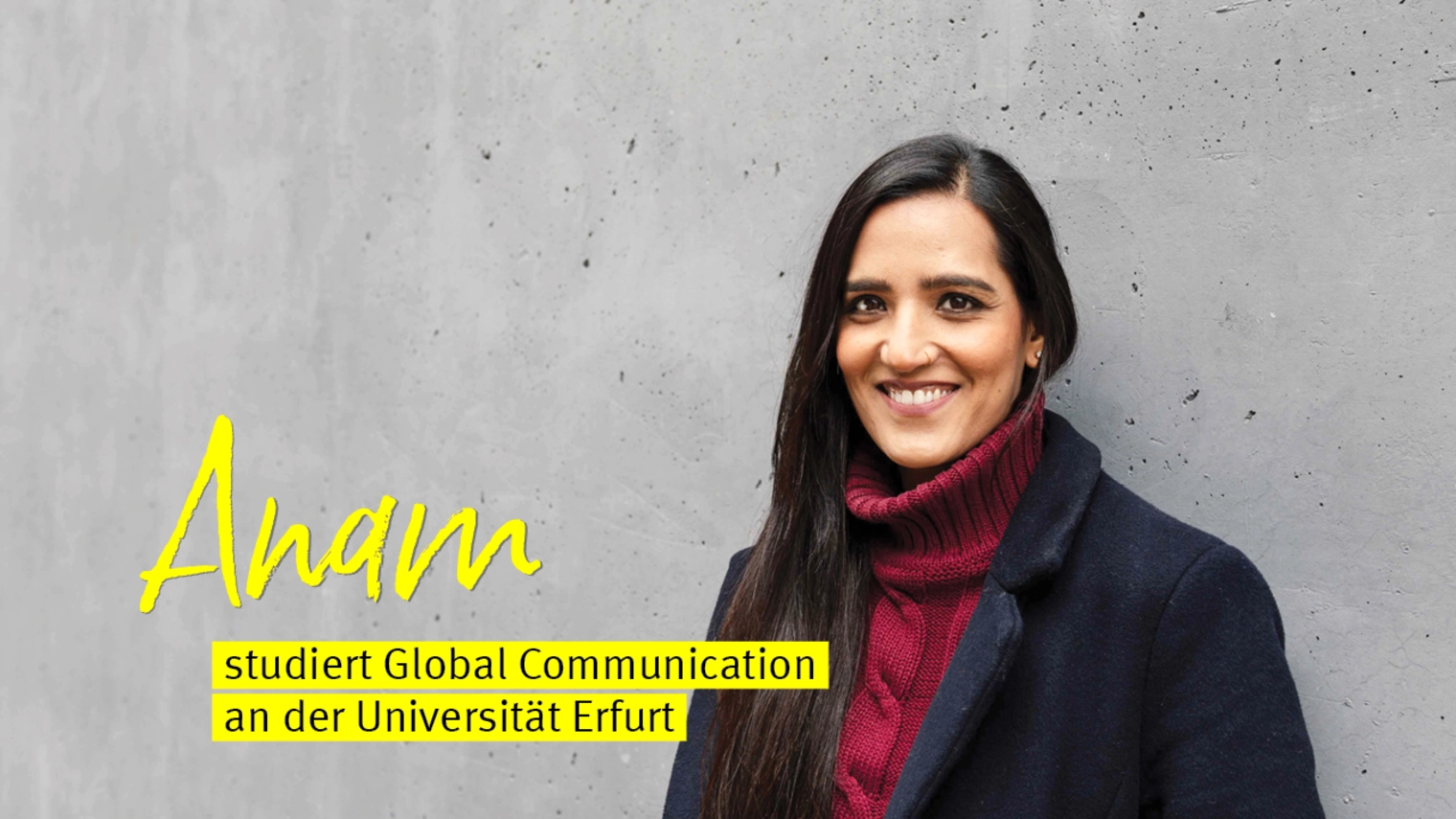
Please note: Once you watch the video, data will be transmitted to Youtube/Google. For more information, see Google Privacy.
Admission requirements
Selection interview and BA final grade
After examining your application, we will invite suitable applicants to a personal interview. All applicants who are not invited to the interview will receive a rejection letter via the application portal.
Invitations are also issued via the application portal and should be confirmed by the applicants without delay. As a rule, all invitees receive an additional notification by email, but we recommend checking the portal regularly due to spam settings.
Interviews are conducted on an ongoing basis and we endeavour to provide prompt re-registration. Due to the varying volume of applications, waiting times for application re-registration may vary slightly. For applications that reach us towards the end of the application period, invitations for subsequent interviews in July/August can only be issued with a short lead time. All interviews are conducted digitally via Webex.
The selection interview lasts approx. 15 minutes and is conducted in English. Your letter of motivation serves as the basis for the interview and is therefore of particular importance! During the interview your
- communication skills and your ability to self-assess,
- your ability to argue scientifically and to analyse problems,
- Your international and intercultural competenceand
- your professional motivationto study this master's programme,
will be assessed.
In the selection process, both the interview and the final Bachelor's degree grade are equally important. You can achieve a maximum of 40 points in the interview. The final Bachelor's degree grade is also converted into points. You can achieve the maximum score of 40 points with a grade of 1.0. One point less is awarded for every 0.1 drop in the grade. If your Bachelor's degree grade is not yet available at the time of application, the grade you need to be admitted will be determined by evaluating the selection interview. You have successfully passed the selection process if you have received at least 60 out of 80 points.
Language requirements
Up to degree level:
- Very good knowledge of English (TOEFL iBT: min. 80 or higher, IELTS 6.5; C1 (CEFR); equivalent to these language requirements is a BA degree in an English-language degree programme or proof of at least 6 months of English-language university study experience in an English-speaking country)
Note for foreign student applicants:
- Foreign students who do not yet speak German are strongly recommended to learn German before and during their studies at the University of Erfurt in order to be able to take advantage of an extended range of courses in German. Appropriate German courses can be taken at the Language Centre of the University of Erfurt.
Language Centre
The Language Centre offers around 140 language courses per semester in 16 modern and old (foreign) languages.
It supports you in acquiring and improving your language skills.
www.uni-erfurt.de/sprachenzentrum
Experience reports and evaluations of the master's programme Global Communication: Politics and Society
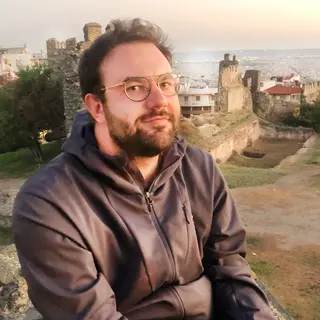
What makes the MA Global Communication so unique is its truly global orientation, which shows both in the widening of its academic lens to include often woefully overlooked regions, societies and media systems of the world and in the wonderfully diverse cultural, academic and personal backgrounds of its students.
Dieses englischsprachige Programm bietet vor allem neue Perspektiven durch eine internationale Gruppe an Studierenden, die ihre Erfahrungen in den zahlreichen Diskussionen teilt. Der Fokus auf global vergleichender Kommunikationswissenschaft bietet die Möglichkeit, bekannte Themen in internationaler Perspektive zu betrachten. Die drei Schwerpunkte Medien, Politik und Gesellschaft sorgen dafür, dass man die Zusammenhänge der Kommunikation in allen relevanten Bereichen versteht und genau betrachtet.

I enjoy especially the deep debates we often have during lectures. There, I was able to engage in healthy exchanges with my course mates from diverse backgrounds; an experience I consider to be a “gift”.
The application period begins on 1 January and ends on 15 July (closing date).
All applications are submitted via an online application portal. Please note that specific documents are required for this degree programme to determine the admission requirements (e.g. letter of motivation, proof of language proficiency, etc., see selection process below). We strongly recommend that you submit your application as early as possible!
Checklist for application documents
- Bachelor's degree certificate
If you do not yet have your Bachelor's degree certificate:
If you intend to complete your studies in the current semester and/or do not yet have a transcript of records or a degree certificate, please select "Studies not yet completed or certificate not yet received" in the online application process. You will then be asked to upload a transcript of records for all study and examination achievements to date during the application process.
Information on application deadlines and application modalities, admission, enrolment can be found at:


